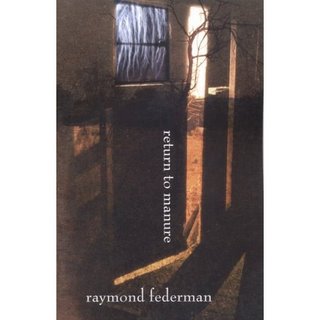November 15, 2006
RETURN TO MANURE REVIEWED IN PUBLISHERS WEEKLY . . .
 From Publishers Weekly: Wry, cantankerous and darkly hilarious aren't the adjectives one expects to use in describing the story of a young boy orphaned by the Holocaust, but veteran experimental writer Federman (Aunt Rachel's Fur), who lost his own family to the Nazis, eschews overt horror and sadness in favor of a lively exploration of the way memory both stimulates and frustrates the storytelling urge. The novel recounts the attempts of the narrator-whose name, biography and bibliography are nearly identical to Federman's--to locate the French farm where he hid from authorities during World War II. It becomes clear early on that the reader is being led on a "double journey...a journey in search of the farm...And the journey in search of the book." As in the best experimental fiction, form and content compliment one another, and the narrator's fragmented memories unfold in a series of engaging anecdotes involving a misanthropic old farmer, a lonely farm wife, a soon-to-be castrated bull and a mysterious woman in a nearby castle. As the title suggests, there are plenty of mordant musings, à la Beckett, on the nature of life, death and excrement. There's also plenty of pathos: the narrator's memories of his father, "the dreamer, l'artiste manqué, the tubercular romantic," are both merciless and deeply moving. A self-conscious and soulful novel, Federman's latest will be relished by his fans and new readers alike.
From Publishers Weekly: Wry, cantankerous and darkly hilarious aren't the adjectives one expects to use in describing the story of a young boy orphaned by the Holocaust, but veteran experimental writer Federman (Aunt Rachel's Fur), who lost his own family to the Nazis, eschews overt horror and sadness in favor of a lively exploration of the way memory both stimulates and frustrates the storytelling urge. The novel recounts the attempts of the narrator-whose name, biography and bibliography are nearly identical to Federman's--to locate the French farm where he hid from authorities during World War II. It becomes clear early on that the reader is being led on a "double journey...a journey in search of the farm...And the journey in search of the book." As in the best experimental fiction, form and content compliment one another, and the narrator's fragmented memories unfold in a series of engaging anecdotes involving a misanthropic old farmer, a lonely farm wife, a soon-to-be castrated bull and a mysterious woman in a nearby castle. As the title suggests, there are plenty of mordant musings, à la Beckett, on the nature of life, death and excrement. There's also plenty of pathos: the narrator's memories of his father, "the dreamer, l'artiste manqué, the tubercular romantic," are both merciless and deeply moving. A self-conscious and soulful novel, Federman's latest will be relished by his fans and new readers alike.Copyright © Reed Business Information, a division of Reed Elsevier Inc. All rights reserved.
Reviews
“Federman pursues his work of memory and imagination with a gravity always kept at a distance, and a touch of nostalgia constantly undercut by a saving humor.”—Le Monde
“In this kind of road movie that oscillates between derision, humor, grinding of teeth, stuttering of memory, pure and simple inventions, and even lies, the old story-teller Federman is not afraid to drivel on. A prodigious masterpiece.”—L’Humanité
“In the tragicomic mode, one cannot do better.”—Télérana
Book Description
In 1942, after hiding to escape the Nazis, our narrator (named, simply, Federman) finds his way to Vichy France. Unwanted by his relatives, he is forced to spend the remainder of the war as an unpaid laborer. For three wordless years on the farm, this thirteen-year-old is assailed by suffering, death, sex, and the back-breaking labor of shoveling manure.
Sixty years later, in the United States, Federma--the author? the narrator? both?--wrestles with nostalgia and bitterness. He finally returns to the farm with his wife, but once the journey is complete he no longer knows why he has made it, nor what he expected to find. Through the merger of fact and fiction, storytelling and reality, memoir and imagination, Return to Manure extends and enhances Raymond Federman’s brilliant ability to side-step narration’s limits and impossibilities.
http://fc2.org/federman/manure/manure.htm

